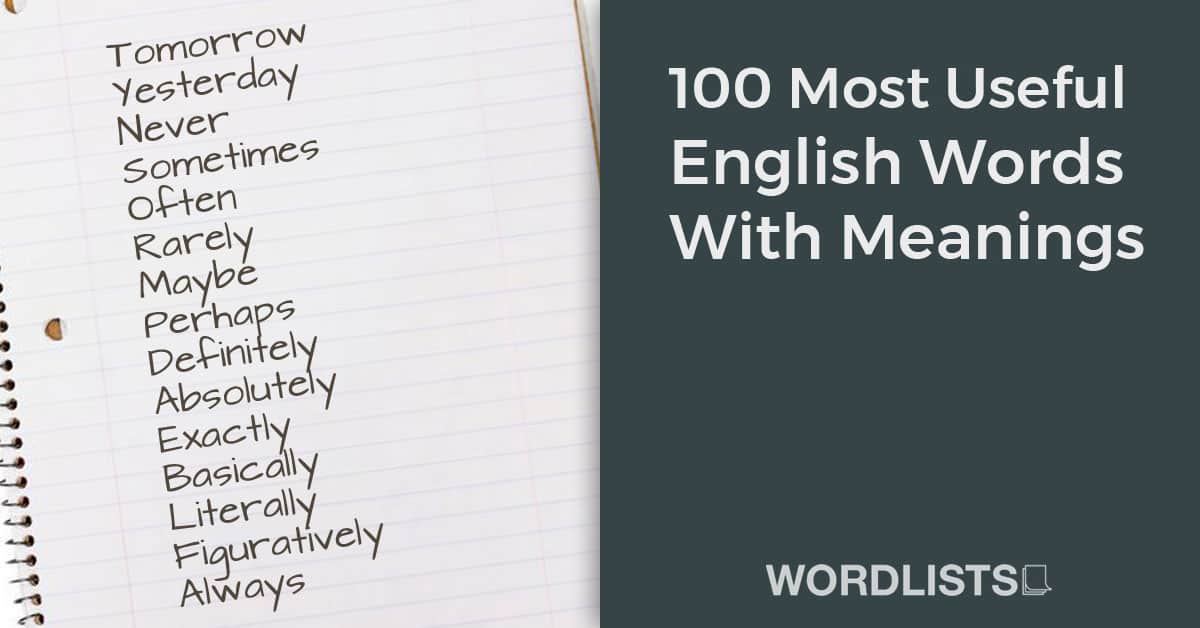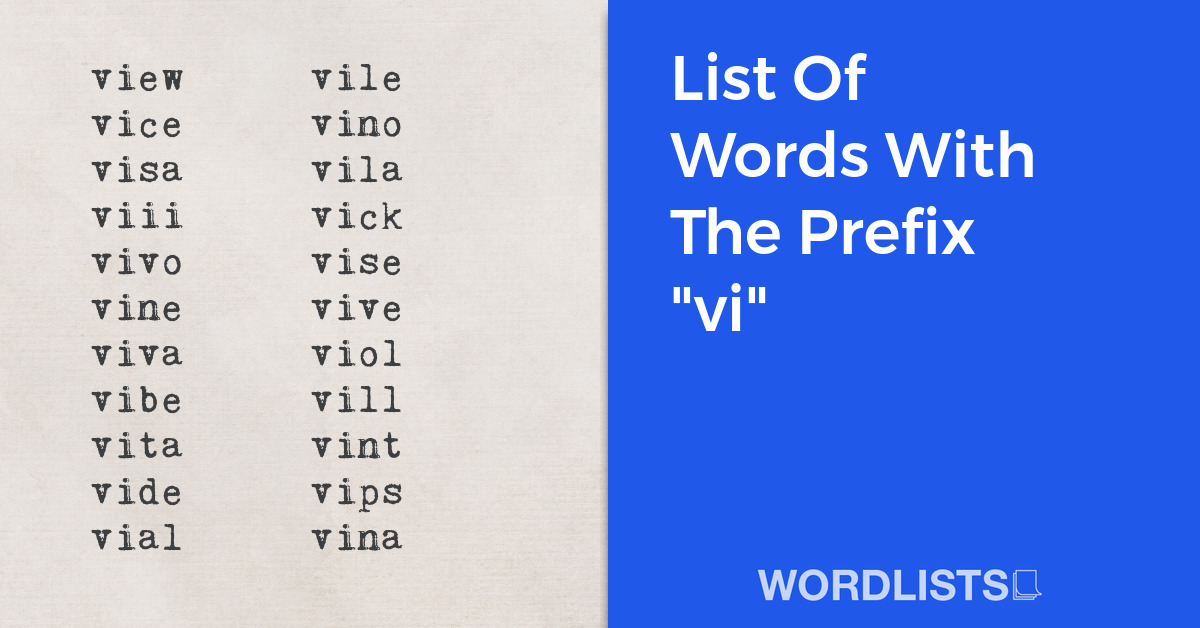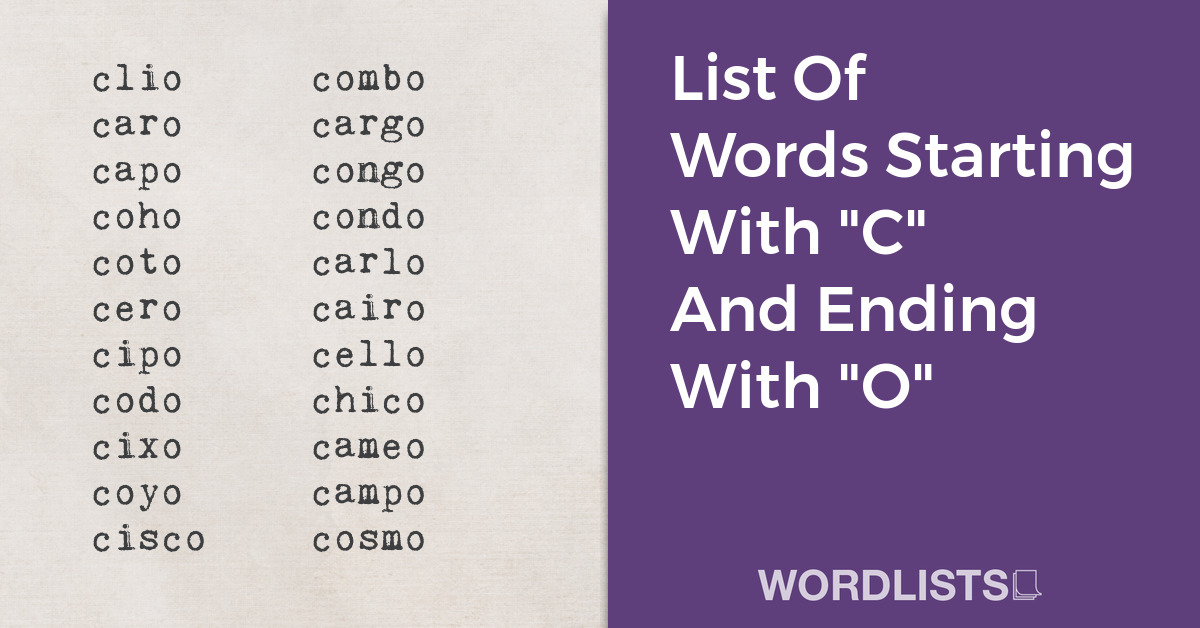English is one of the most widely spoken languages in the world, used as a primary or secondary language in many countries around the globe. There are many thousands of useful, everyday words that form a solid backbone to the language.
Whether you are a non-native speaker looking to improve your English skills or a native speaker looking to expand your vocabulary, having a good grasp of essential English words can be immensely beneficial.

Subscribe to our mailing list to receive FREE exclusive content and offers!
In this list, we have compiled 100 of the most useful English words and their meanings that can be applied to various contexts, from everyday conversation to business communication and academic writing. We hope it’s useful to you!
Hello – A greeting used to acknowledge someone’s presence or start a conversation.
Goodbye – A farewell used when parting ways with someone.
Thank you – An expression of gratitude or appreciation.
Please – A polite word used to make a request or to show courtesy.
Yes – A word used to indicate agreement or affirmation.
No – A word used to indicate disagreement or negation.
Sorry – An apology used to express regret for a mistake or offense.
Excuse me – A phrase used to politely interrupt or gain someone’s attention.
How are you? – A greeting used to inquire about someone’s well-being.
Fine – A response to the question “How are you?” to indicate that one is doing well.
Good – A response to the question “How are you?” to indicate that one is doing fine.
Bad – A response to the question “How are you?” to indicate that one is not doing well.
Very – An adverb used to intensify a statement or to indicate a high degree of something.
Really – An adverb used to emphasize the truth or importance of a statement.
Well – An adverb used to indicate good health or a state of being satisfactory.
So – A conjunction used to indicate a consequence or to emphasize a point.
Then – An adverb used to indicate a time or a sequence of events.
Now – An adverb used to indicate the present time or a current situation.
Today – An adverb used to indicate the current day or a specific day.
Tomorrow – An adverb used to indicate the day after today.
Yesterday – An adverb used to indicate the day before today.
Never – An adverb used to indicate that something does not happen or has not happened at any time.
Sometimes – An adverb used to indicate that something happens occasionally or not always.
Often – An adverb used to indicate that something happens frequently or regularly.
Rarely – An adverb used to indicate that something happens infrequently or almost never.
Maybe – An adverb used to indicate uncertainty or a possibility.
Perhaps – An adverb used to indicate uncertainty or a possibility.
Definitely – An adverb used to indicate certainty or a strong agreement.
Absolutely – An adverb used to indicate complete agreement or emphasis.
Exactly – An adverb used to indicate precision or accuracy.
Basically – An adverb used to indicate the fundamental or underlying nature of something.
Literally – An adverb used to indicate that something is true or accurate in a strict sense.
Figuratively – An adverb used to indicate that something is not to be taken literally but rather metaphorically or symbolically.
Always – An adverb used to indicate that something happens all the time or on every occasion.
Often – An adverb used to indicate that something happens frequently or regularly.
Excited – A feeling of enthusiasm or eagerness about something.
Tired – A feeling of weariness or exhaustion due to physical or mental exertion.
Happy – A feeling of pleasure or contentment.
Sad – A feeling of sorrow or unhappiness.
Angry – A feeling of strong displeasure or hostility.
Scared – A feeling of fear or apprehension.
Nervous – A feeling of anxiety or unease.
Confused – A feeling of uncertainty or bewilderment.
Bored – A feeling of ennui or lack of interest in something.
Frustrated – A feeling of disappointment or annoyance.
Love – A strong affection or attachment to someone or something.
Hate – An intense feeling of dislike or aversion to someone or something.
Want – A desire or a wish to have or do something.
Need – A necessity or a requirement for something.
Like – A positive attitude or fondness for someone or something.
Dislike – A negative attitude or aversion to someone or something.
Enjoy – A feeling of pleasure or satisfaction from an activity or experience.
Do – To perform an action or task.
Go – To travel or move to a different location.
See – To perceive or observe something with one’s eyes.
Hear – To perceive or listen to sounds with one’s ears.
Speak – To communicate with words or speech.
Listen – To pay attention to and hear what someone is saying.
Read – To look at and understand written or printed words.
Write – To put words down in writing or to compose a text.
Learn – To acquire knowledge or skills through study or experience.
Teach – To impart knowledge or skills to someone else.
Think – To have a mental process or to consider something.
Feel – To experience an emotion or sensation.
Remember – To recall something from the past or from memory.
Forget – To not remember or to fail to recall something.
Meet – To come into contact or interact with someone for the first time.
Know – To have knowledge or awareness of something or someone.
Believe – To have faith or trust in something or someone.
Understand – To comprehend or grasp the meaning of something.
Help – To assist or support someone who needs aid or assistance.
Use – To employ or utilize something for a particular purpose.
Buy – To purchase or acquire something in exchange for money or goods.
Sell – To exchange something for money or goods.
Eat – To consume food or drink for nourishment.
Drink – To consume a liquid, such as water or juice.
Sleep – To rest or slumber for a period of time.
Shower – To cleanse oneself with water.
Brush – To clean or groom something with a brush, such as teeth or hair.
Comb – To groom or arrange hair with a comb.
Shave – To remove facial or body hair with a razor or shaver.
Dress – To put on clothing or attire.
Undress – To remove clothing or attire.
Watch – To observe or look at something for a period of time.
Play – To engage in an activity or game for enjoyment or amusement.
Work – To engage in a job or activity to earn a living.
Study – To learn or research a subject in an academic or formal.
Cook – To prepare food by heating or combining ingredients.
Clean – To remove dirt or impurities from something.
Tidy – To organize or straighten up something.
Fix – To repair or mend something that is broken or damaged.
Drive – To operate a vehicle or transport something or someone in a vehicle.
Make – To create or produce something.
Resilient – Able to withstand or recover quickly from difficult conditions.
Ambiguous – Having a double meaning or being unclear or uncertain.
Efficient – Capable of producing desired results without wasting time, energy, or resources.
Punctual – Arriving or happening at the appointed time; on time.
Robust – Strong and healthy; capable of withstanding difficult conditions.
Pragmatic – Practical and realistic; concerned with practical results rather than theories or principles.
Tenacious – Persistent and determined; not giving up easily.







